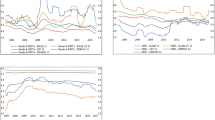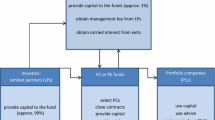Abstract
This study is an attempt to evaluate the investment management of Indian mutual funds in terms of the timing abilities of fund managers during May 31, 2000 to March 31, 2012. The study has also adopted conditional performance evaluation measure in order to evaluate performance of Indian mutual funds. The results relating to the market timing skills of fund managers based on unconditional Treynor–Mazuy and Henriksson–Merton models have revealed that majority of the fund managers were unable to time the market correctly during the period under consideration. However, conditioning only on public information improves the coefficient of determination.
Similar content being viewed by others
Notes
The authors constructed a database of 404 equity schemes. However, majority of those schemes disappeared within the period of study. Only 80 schemes were left with data for entire study period.
It is found from the websites of the different mutual funds that the balanced schemes of the sample invest 60–70 % of their fund in equity and the rest in the debt security. So, they are very much exposed to equity. Besides, it is also found that such balanced schemes use CRISIL Balanced Fund Index as the benchmark index which is the benchmark for equity-oriented hybrid portfolios and is a blend of the CNX Nifty Index (65 %) and the CRISIL Composite Bond Fund Index (35 %). This is why the study has treated these schemes as equity schemes.
(i) Introduction of derivatives trading, compulsory rolling settlement and 99 % VaR-based margin system, liberalized policies for FDI and FII participation in the domestic economy, etc., and (ii) bifurcation of UTI, FRBM Act, NREGA Act, Sub-prime crisis, etc.
References
Ahmad M, Samajpati U (2010) Evaluation of stock selection skills and market timing abilities of Indian mutual fund managers. Manag Insight 6(2):71–82
Becker C, Ferson WE, Myers DH, Schill MJ (1999) Conditional market timing with benchmark investors. J Empir Financ 52:119–148
Bollen NPB, Busse AJ (2001) On the timing ability of mutual fund managers. J Financ LVI:1075–1094
Chander R (2006) Investment managers’ market timing abilities: empirical evidence from the Indian capital market. IIMB Manag Rev 18(4):315–326
Chang EC, Lewellen GW (1984) Market timing and mutual fund investment performance. J Bus 57(1):57–72
Chang JR, Hung MW, Lee CF (2003) An intertemporal CAPM approach to evaluate mutual fund performance. Rev Quant Financ Acc 20:415–433
Chen CR, Cheng Lee F, Rahman S, Chan A (1992) A cross sectional analysis of mutual fund’s market timing and security selection skill. J Bus Financ Acc 19(5):659–675
Chen S Nan, Jang H (1994) On selectivity and market timing ability of US based international mutual funds: using refined Jensen’s measure. Global Financ J 5(1):1–15
Chen NF, Roll R, Ross SA (1986) Economic forces and the stock market. J Bus 59(3):383–403
Chopra MP (2011) Do Indian mutual fund managers select the stock and time the market correctly? 6 16:66–80
Cuthbertson K, Nitzsche D, O’Sullivan N (2010) The market timing ability of UK mutual funds. J Bus Financ Acc 37(1):270–289
Elton EJ, Gruber MJ, Blake CR (2011) An examination of mutual fund timing ability using monthly holdings data. Rev Financ 0:1–27
Ferson WE, Schadt RW (1996) Measuring fund strategy and performance in changing economic conditions. J Financ L1(2):425–461
Goetzmann WN, Ingersoll J, Ivkovic Z (2000) Monthly measurement of daily timers. J Financ Quant Anal 35(3):257–290
Grinblatt M, Titman S (1989) Mutual fund performance: an analysis of quarterly portfolio holdings. J Bus 62(3):393–416
Guha Deb S, Banerjee A, Chakrabarti BB (2007) Market timing and stock selection ability of mutual funds in India: an empirical investigation. Vikalpa 32(2):39–51
Gupta A (2000) Market timing abilities of Indian mutual fund manager: an empirical study. Appl Financ 6(2):47–61
Gupta OP, Sehgal S (2001) Investment performance of mutual funds: the Indian experience. In: Shashikant U, Arumugam S (eds) Indian capital markets: trends and dimensions. Tata McGraw-Hill, New Delhi
Henriksson Roy D (1984) Market timing and mutual fund performance: an empirical investigation. J Bus 57(1):73–96
Henriksson Roy D, Merton RC (1981) On market timing and investment performance. II. Statistical procedures for evaluating forecasting skills. J Bus 54(4):513–533
Holmes KA, Faff RW (2004) Stability, asymmetry and seasonality of fund performance: an analysis of Australian multi-sector managed funds. J Bus Financ Acc 31(3&4):539–578
Jagannathan R, Korajczyk R (1986) Assessing the market timing performance of managed portfolios. J Bus 59:217–235
Jiang W (2003) A nonparametric test of market timing. J Empir Financ 10(4):399–425
Jiang GJ, Yao Tong, Tong Yu (2007) Do mutual funds time the market? Evidence from portfolio holdings. J Financ Econ 86:724–758
Kon Stanley J (1983) The market timing performance of mutual fund managers. J Bus 56(3):321–347
Kumar R (2012) Market timing, selectivity and mutual fund performance: an empirical investigation of selective equity diversified schemes in India. IUP J Financ Econ 10(1):62
Kumar GD and M Dash. A study on the effect of macroeconomic variables on Indian mutual funds. http://ssrn.com/abstract=1316442. Accessed 1 Dec 2013
Mishra B (2002) Selectivity and timing skills of mutual funds in India: an empirical analysis. ICFAI J Appl Financ 8(5):5–16
Nathani N, Chakraborty A, Rawat B, Holani U (2011) Timing skills of fund managers: a study of equity mutual fund schemes. Bus Spectr I(1):9–18
Narasimhan MS, Vijayalakshmi S (2001) Performance analysis of mutual funds in India. Financ India 15(1):155–174
Rao KV, Venkateswarlu K (2001) Market timing abilities of fund managers—a case study of Unit Trust of India. In: Shashikant U, Arumugam S (eds) Indian capital markets: trends and dimensions. Tata McGraw-Hill, New Delhi
Sadhak H (2003) Mutual funds in India: marketing strategies and investment practices, 2nd edn. Response Books (A division of Sage Publications India Pvt. Ltd.), New Delhi
Saez JC (2008) The dynamics of mutual funds and market timing measurement. Stud Nonlinear Dyn Econ 12(4):1–38
Sehgal S, Jhanwar M (2008) On stock selection skills and market timing abilities of mutual fund managers in India. Int Res J Financ Econ 15:299–309
Sethu G (2001) The mutual fund puzzle. In: Arumugam S (ed) Indian capital markets: modern perspectives and empirical evidences. Allied Publishers, Mumbai
Thiripalraju M, Patil PR (1998) Micro and macro forecasting abilities of Indian fund managers. In: Madhusoodanan TP (ed) Indian capital markets: theories and empirical evidence. UTI Institute of Capital Markets and Quest Publications, Mumbai
Treynor J, Mazuy M (1966) Can mutual funds outguess the market? Harv Bus Rev 44(4):131–136
Tripathy NP (2006) Market timing abilities and mutual fund performance—an empirical investigation into equity linked saving schemes. Vilakshan XIMB J Manag 127–138
Author information
Authors and Affiliations
Corresponding author
Rights and permissions
About this article
Cite this article
Dhar, J., Mandal, K. Market timing abilities of Indian mutual fund managers: an empirical analysis. Decision 41, 299–311 (2014). https://doi.org/10.1007/s40622-014-0036-2
Published:
Issue Date:
DOI: https://doi.org/10.1007/s40622-014-0036-2




